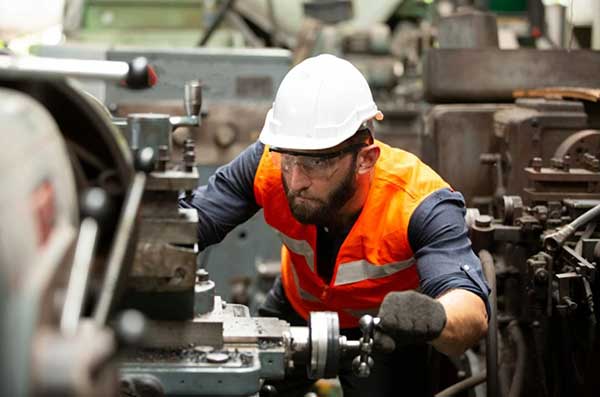Overseas workers are laying the foundations for growth. What do UK migration reforms mean for an industry reliant on overseas workers?
By Ciara Farrell, General Manager, Aureol Global Connections
Standing tall across British and Irish cities, the cranes that mark the progress of our developing urban cityscape. But behind that façade, an industry under pressure.
The latest CITB figures suggest that the UK needs an extra 251,500 construction workers by 2028 to meet expected levels of work – some 50,300 new workers per year, while Irish Tech News reports that the shortage of workers in Ireland is affecting the country’s ability to meet housing targets, with concerns about achieving the goal of 33,000 homes per year by 2030. These shortages affect private housing, infrastructure and repairs and maintenance, slowing down projects and creating costly delays.
Migrant workers play a crucial role in the construction industries of both the UK and Ireland, but recent immigration reforms outlined by the UK government mark a significant shift in the approach to migration, emphasising a reduced reliance on foreign labour and increased self-sufficiency. While these changes aim to address public concerns about migration, they also present challenges for industries that depend on a diverse and flexible workforce. Many construction companies have built their business models around the availability of migrant labour. Removing or restricting access to this workforce raises fundamental questions about the industry’s future capacity.

The UK government’s 2025 immigration reforms have tightened the eligibility criteria for foreign workers. The changes are aimed at reducing net migration, tightening visa eligibility and prioritising high-skilled migration. The reforms are being rolled out gradually, with some changes already underway and others subject to consultation and implementation by 2029.
Key changes include:
The cumulative effect is a squeeze on the labour supply, just as demand for housing and infrastructure is rising.
With fewer overseas workers available, the construction industry is feeling the strain. Project delays are becoming more frequent, labour costs are climbing and many firms are struggling to scale operations to meet new contracts and new government targets.
But the consequences go beyond missed deadlines and rising costs. Labour shortages are beginning to erode safety and quality standards. A stretched workforce has less time for training, upskilling or maintaining rigorous site protocols. In an industry where precision and safety are non-negotiable, this is a serious concern.
In the year 2023-2024 in the UK, 51 construction workers died due to work-related accidents, the highest level since 2008 – 2009, and the rate of fatal injury in construction is five times as high as the average rate across all industries, highlighting need for safety measures to be adhered to vehemently to protect the lives of workers in this high-risk sector. A rapid turnover of workers, especially those with less experience, can increase these risks as employees onboard and become familiar with site-specific hazards.
The construction sector already battles with low productivity and high turnover. Without access to a reliable and skilled labour pool, whether domestic or international, these challenges risk becoming entrenched. The result? A slower, more expensive and potentially less safe construction pipeline at a time when the UK urgently needs to build.
Hiring overseas talent isn’t about cutting costs or cutting corners. It’s about something far more strategic and far more necessary. The right people, in the right roles, can transform a business and when you’re building for the future, you don’t limit your search by borders, you look for excellence wherever it lives.
For many UK businesses, skilled Filipino workers have become a cornerstone of that search. Not just because they’re competent and consistent, but because they bring a deep-rooted work ethic and a commitment to craftsmanship that goes beyond the job description. And that’s not just sentiment, it’s a serious business asset.
The reality of imported labour isn’t about compromise. It’s about collaboration. It’s about filling real skills gaps with real people who are ready to do the work. These aren’t temporary hires or stopgaps. These are individuals who become integral to operations, who grow with your business and help it grow in return.
To work around the constraints of the incoming migration laws, construction firms must adopt a more strategic and diversified approach to labour sourcing. This includes focusing on roles that remain on the Shortage Occupation List, increasing pay to meet visa thresholds and exploring alternative routes like the Graduate visa, Youth Mobility Scheme or partnering with agencies that hold sponsorship licences. Additionally, building international training pipelines and forming partnerships with vocational providers abroad can help ensure overseas recruits are job-ready and eligible under UK rules.
At the same time, firms can look to improve domestic workforce development by expanding apprenticeships, reskilling underemployed UK workers and collaborating with trade bodies to advocate for construction-specific immigration routes and recognition of overseas qualifications. By combining immediate compliance strategies with longer-term investments in talent, UK construction firms can continue to access international labour while building a more resilient, future-ready workforce.
The workforce challenges facing the UK and Ireland are real, and growing. The solution isn’t to look inward and close off opportunity. It’s to look outward, widening the lens and recognising the immense value that global talent brings, especially in sectors where domestic supply simply cannot meet demand.
This is especially evident in the UK construction industry, which stands as a living case study of what’s possible when people from diverse backgrounds come together to build. From city skylines to rural infrastructure, the industry’s progress has been fuelled by a global workforce. Migration reform may be driven by broader political agendas, but its impact on construction is immediate, measurable and too often underestimated.
If Britain is serious about delivering the homes, hospitals, schools and transport systems it needs, then it must treat overseas workers not as a contingency, but as a cornerstone of growth. That means creating pathways for skilled workers. It means recognising the value of cultural intelligence, work ethic and long-term commitment. In the end, this is about more than policy. It’s about leadership, and the courage to build a workforce that reflects the future we want to create.

About the Author:
Ciara Farrell is General Manager at Aureol Global Connections, where she drives international recruitment solutions that connect employers with highly skilled talent. With three years leading operations and client solutions at Aureol Global Connections and a background throughout management and operations in other roles, Ciara is known for her sharp insights, practical leadership and ability to solve complex workforce challenges from end-to-end.
Scott Ellyson, CEO of East West Manufacturing, brings decades of global manufacturing and supply chain leadership to the conversation. In this episode, he shares practical insights on scaling operations, navigating complexity, and building resilient manufacturing networks in an increasingly connected world.